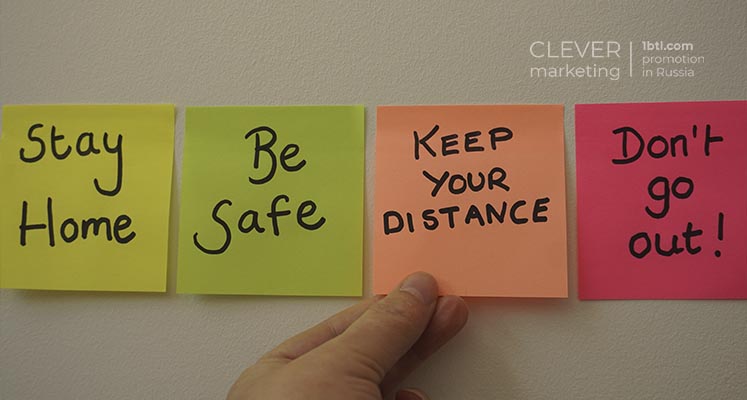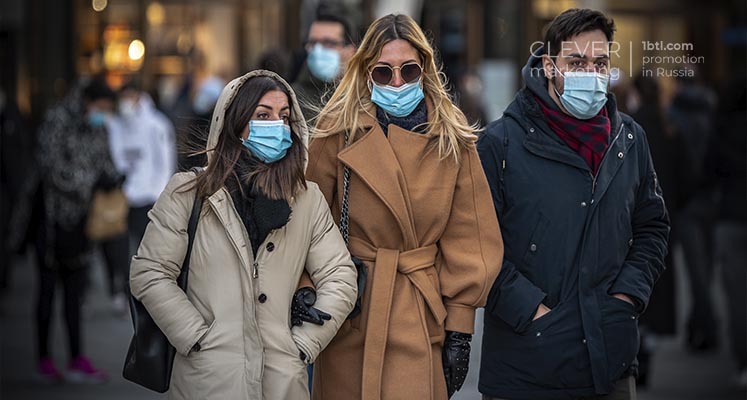New restrictions in Russia due to the new COVID outbreak.
The incidence of coronavirus is growing sharply in Russia. In Moscow, more than 5 thousand infected people are detected daily per day. Regions are introducing new restrictions. The main ones are here, in our new article.
Mandatory vaccination
Regions are gradually introducing mandatory vaccination against COVID-19, which more often affects employees of trade, catering, services, transport, healthcare and other categories. They were required to be vaccinated in more than 30 regions.
But Russia is also strengthening other measures to combat the coronavirus. Some of them coincide with the restrictions that were introduced in the regions with an increase in the incidence of diseases in autumn and winter, but some differ.
Restrictions and prohibitions for public catering
In almost 40 regions, cafes and restaurants are now unable to receive guests at night, but they work for takeaway and delivery. An exception was made for catering outlets at gas stations, airports, railway stations and bus stations. The ban on night work of restaurants in many regions is valid from 23: 00 to 07: 00, but in Transbaikalia, for example, catering closes at 21: 00 local time, and in Primorye restaurants and cafes can work until 02: 00.
Moscow restaurants are also prohibited from working at night, but this requirement does not apply to “COVID-19-free” points, that is, those where people vaccinated against coronavirus or people with negative PCR tests are allowed.
In many regions, visitors to shopping centers were forbidden to sit at tables near food courts. There they can only work for delivery and takeaway. But in some regions of the Federation, for example, the Tomsk Region, visitors to food courts were allowed not to take food with them, but the number of seats for planting was reduced by half.
Restrictions and prohibitions on mass events
The most popular measure to combat coronavirus is a ban or restrictions on mass events. In the Astrakhan, Vladimir, Leningrad regions, Perm Krai and other subjects of the Federation, events can only be held outdoors, although there the number of participants is limited or they may need a certificate of vaccination against coronavirus, a negative PCR test to pass.
Residents of the Nizhny Novgorod region who have been vaccinated, have had COVID-19 or have received negative test results will be allowed to attend events on” anti-covid “passes” Multipass 800″.
In some regions, for example, the Vologda Region, Transbaikalia, events are prohibited both indoors and outdoors.
Switching to remote work
Some regions that have canceled the requirement to transfer some employees to remote work with a decline in morbidity, are returning this rule. Since June 25, mandatory removal for at least a third of employees has been in effect in Moscow.

In the Moscow region, so far, they only recommend transferring as many employees as possible to a remote format. About 20 regions have so far been obliged or recommended to send only citizens from groups vulnerable to coronavirus-the elderly (over 65 years old), pregnant women, people with chronic diseases.
Reducing the occupancy rate of halls in cinemas, theaters and other institutions
In many regions, there is also a restriction on the occupancy of sports stands and auditoriums in cultural institutions (cinemas, theaters, concert halls, philharmonic halls, etc.). In general, the audience should occupy no more than 50% of the total capacity of the hall, in some regions, for example, Omsk, Nizhny Novgorod, Orenburg regions, Kalmykia, Karelia, they are allowed to occupy up to 75% of the seats.
Restrictions and prohibitions on the operation of children’s rooms in shopping centers and public catering
Children’s playrooms in shopping centers and restaurants do not work in many regions. In addition, in some regions (for example, in the Volgograd and Kaliningrad regions), minors are not allowed to visit public places without adults. In the Tver, Tomsk, and Vladimir regions, there are occupancy restrictions for children’s rooms — no more than 50% of visitors from the maximum capacity.
In the Yaroslavl region, children’s entertainment rooms in shopping centers are closed on weekends and holidays. In the Moscow region, you can visit them with the help of QR codes that are received by vaccinated people.
Other restrictions
Some regions have also banned the operation of nightclubs, discos, karaoke and hookah bars. Similar measures are in effect in Chuvashia, Tatarstan, the Republic of Mari El, the Rostov Region, and Kamchatka.

Since June 13, the Ivanovo Region has introduced a pass regime for everyone who comes to the region from Moscow, Kostroma and Yaroslavl. Those arriving should go to a two-week quarantine (it will not be necessary for vaccinated, recently ill or people with negative PCR tests).
Tuva became the first region that banned the operation of public transport on weekends, in Chechnya, the mask regime for passengers and drivers of public transport was tightened — they will not be allowed inside without masks.
In some regions, hotels are no longer inhabited without a vaccination certificate or a negative PCR test. Among them are the Astrakhan, Vladimir, Murmansk, Omsk, Pskov regions, Buryatia, Adygea, Kamchatka Krai, Dagestan. The most stringent measures for tourists are in the Krasnodar Territory.
From August 1, only vaccinated visitors will be settled in hotels there, even if they stay for a couple of days. You can get vaccinated on the spot — vaccination points will be opened directly in hotels and sanatoriums.